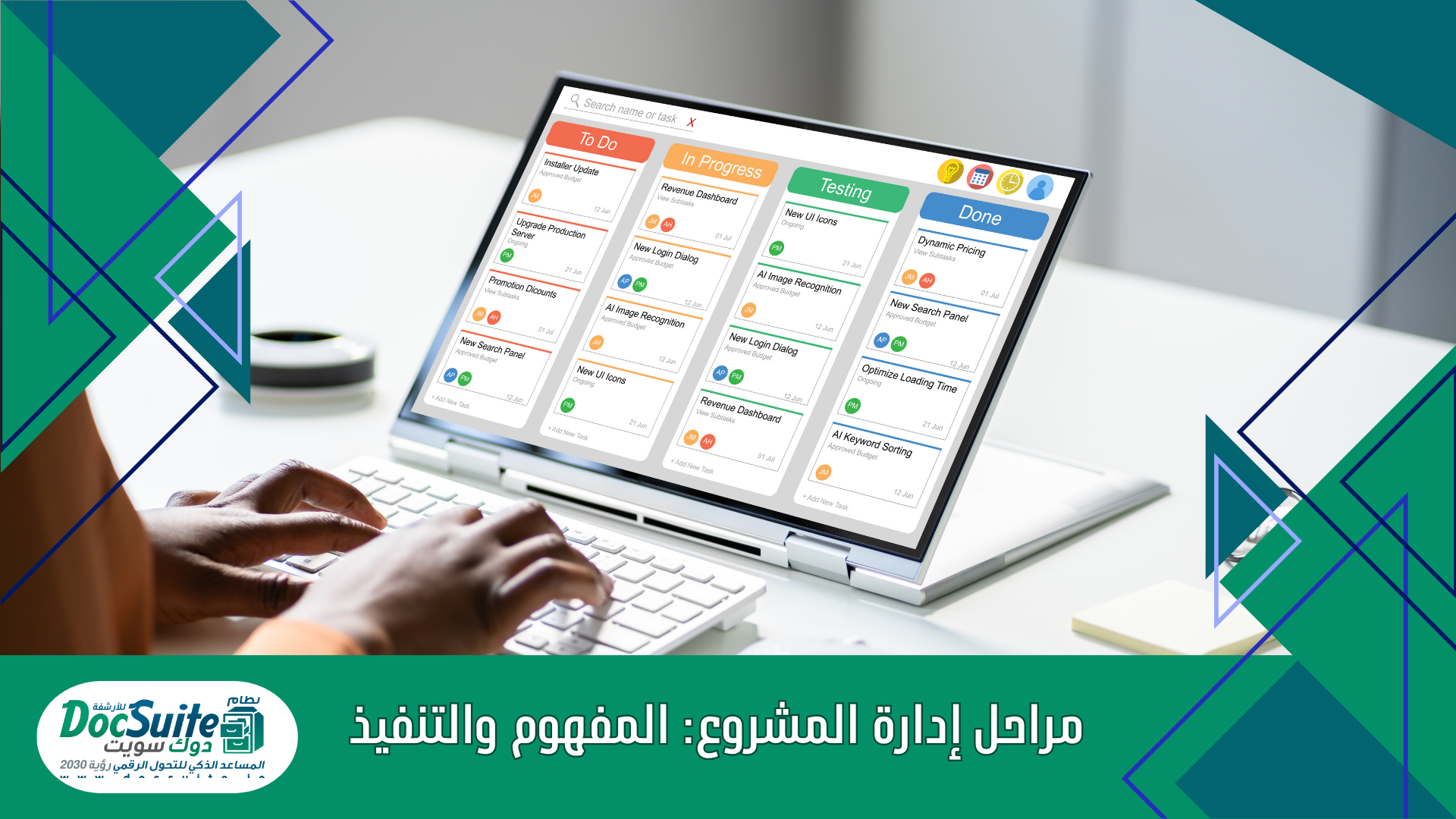فهرس الموضوع
Project Management Phases: Concept and Implementation
Organizations face significant challenges in project management, as the process requires careful planning, effective coordination, and continuous monitoring to ensure successful project implementation. Project management stages from planning and implementation to monitoring and closure are critical stages that require strong strategies and tools to organize operations and ensure efficient achievement of objectives.
This is where DocSuite comes in, the electronic application that provides innovative and effective solutions for organizations in all stages of project management. DocSuite is an advanced tool that combines smart document management and administrative communications organization, which contributes to facilitating communication between work teams and facilitating tracking of project progress.
In this article, we will discuss how organizations can benefit from DocSuite during the various stages of project management, and how this system can be a vital partner in achieving organizational success.
What are the stages of project management?
Project management is one of the essential tasks that determine the success of any project, whether small or large. It requires careful planning and organized implementation to ensure the achievement of the desired goals. As for the “project management stages”, the process involves several interconnected steps that together form an integrated framework that enables work teams to successfully implement and manage the project.
It is important to note that project management today has become easier and more effective thanks to the great technological development, as smart systems such as “DocSuite” play an important role in facilitating and organizing administrative processes related to project management, which enhances the effectiveness and efficiency of teams.
Phase 1: Defining the project scope and planning
At this stage, the concerned team begins to define the main objectives of the project, clarify the scope of work accurately, as well as determine the necessary resources and the expected timeline. This aspect requires continuous organization and comprehensive follow-up of all the fine details related to project management.
This is where smart systems like DocSuite come in, managing and organizing documents and helping in communication between stakeholders. With DocSuite, the team can convert all documents into an easily accessible digital format, speeding up the planning process and reducing human errors resulting from traditional paper management.
With intelligent systems like DocSuite, project managers can allocate tasks and manage scheduling more efficiently. The team can handle any changes to the project plan faster and more accurately, because DocSuite combines process automation with artificial intelligence that enables monitoring progress and addressing issues in real time. This means that this phase of planning, which is considered one of the most important phases of project management, can be done with the highest level of accuracy and flexibility, which contributes to achieving goals faster.
Phase 2: Project Implementation and Operations Management
After defining the objectives and scope of the project, comes the implementation phase, which requires complete coordination between all team members. This phase includes the actual work on the project, and monitoring the progress of operations in line with the plan. This phase requires great flexibility, so that it can adapt to any challenges that may arise during the course of work. At this stage, there can be overlap between different teams and departments working on different aspects of the project, which makes effective coordination of utmost importance.
This is where platforms like DocSuite come in handy, providing a unified environment for communication and reporting across teams. Using this system, it becomes easy to track all project-related documents, and exchange information and updates quickly and efficiently. The system also allows for the automation of procedures, which reduces the administrative burden on teams and allows them to focus on more important activities. Managers can track project performance around the clock using real-time reports, which improves coordination between teams and facilitates on-time project execution.
Phase 3: Monitoring the project and controlling progress
Project monitoring and progress control are two essential parts of ensuring that the project is on track. At this stage, periodic assessments are conducted to measure the progress of the work against the schedule and budget. Smart tools such as DocSuite are used to manage this stage efficiently by providing innovative solutions for data analysis and flexible reporting. Using the system, all aspects of the project can be monitored in real time, enhancing the ability to quickly adapt to any modifications or changes that may occur.
The use of AI technologies in DocSuite helps in analyzing data in-depth to identify points that need improvement. By alerting early of any delay or budget overrun, managers can take the necessary actions to correct the course. The system also provides an automatic alert feature when reaching certain points in the project, which helps in maintaining the workflow in an organized and accurate manner. Thanks to the smart reports integrated into the system, all stakeholders can follow the workflow and contribute to making important decisions quickly and effectively.
Phase 4: Project Closure and Performance Evaluation
The project closure phase is a critical phase that ensures that all objectives have been achieved and that the project has been delivered according to the specified requirements. In this phase, all results are delivered, all procedures are completed, and final reports are prepared. The overall performance of the project is evaluated and lessons learned from the implemented operations are extracted. This phase requires strict organization and complete transparency in dealing with final documents and reports.
DocSuite plays an important role in facilitating project closure, as it stores all project-related documents in an organized and easily accessible manner. The concerned teams can classify the final documents, and ensure that all required procedures are completed, through a unified and secure digital system. With DocSuite, the team can send final reports and follow up on final notes, which helps ensure that the project has been closed smoothly and according to the agreed standards.
Given that project management in the current era has become heavily dependent on technology, integrating systems such as DocSuite into all phases of the project enhances performance efficiency and contributes to accelerating the completion of tasks accurately and effectively. Thanks to its flexibility and ease of use, DocSuite is a successful investment that helps organizations improve project management, save time, and ensure the quality of results according to international standards.
Project management requires full attention to every detail from the moment of planning to the project closure. The four stages of project management, which include defining the scope, executing, monitoring, and closing, require effective tools to organize the work and ensure the smooth running of operations. Smart systems such as DocSuite contribute greatly to facilitating these stages, by improving document management and organizing administrative processes in an innovative way.

Assisting organizations in project management stages
The role of DocSuite in assisting organizations in the project management stages is of utmost importance, as it contributes to enhancing efficiency, reducing errors, and achieving the best results at every stage of project management. By integrating DocSuite into project management, organizations can significantly improve their operations, as this system provides a set of smart tools that facilitate planning, implementation, monitoring, and closing more efficiently. Here is how DocSuite can help at every stage of project management. Project management stages:
- Planning and scoping the project:
In the planning phase, defining the project scope and setting key objectives is one of the first important steps. DocSuite helps organizations in this phase by organizing all project-related documents in one place, making them easy to access and share across different teams.
The system also allows for easy management of meetings and reports, helping teams analyze data, define tasks, and organize the project schedule accurately. Thanks to DocSuite’s integration with AI technologies, teams can anticipate any challenges that may face the project in the future and prepare solutions in advance.
- Implementation and organization of operations:
During the implementation phase, teams need close coordination and continuous organization between individuals and different teams. DocSuite provides a unified electronic environment where all stakeholders can update task progress, share files, and organize documents centrally. This helps reduce errors resulting from the exchange of paper documents or uncoordinated electronic copies.
The system enables the automation of procedures and facilitation of daily tasks, ensuring a more flexible and accurate workflow. DocSuite also provides tools that allow you to monitor project progress in real time, allowing organizations to quickly make necessary adjustments when needed.
- Monitor progress and adjust course:
Monitoring progress and ensuring that the project is on track is one of the most important tasks in any project. DocSuite helps at this stage by providing comprehensive and timely reports on project performance, allowing project managers to identify any deviations from schedule or budget.
With these smart tools, the team can monitor every aspect of the project, whether it is related to quality or operational efficiency. Thanks to automatic reporting and AI-powered analysis, the system can prioritize work and ensure that processes are moving in the right direction without the need for frequent manual intervention.
- Closing and final evaluation:
When it comes to closing, the need to document all deliverables, evaluate performance, and extract lessons learned is essential. This is where DocSuite comes in to facilitate the organization of final documents and evaluation reports in a way that is easy to access and use. Organizations can complete the project closing process smoothly through the system’s tools that help securely and organizedly collect all documents. The system also allows organizations to archive all project-related documents and information for future reference, facilitating review and evaluation processes.
- Automate procedures and achieve efficiency:
Throughout all stages, DocSuite helps automate many routine administrative procedures, reducing the human effort required and allowing teams to focus on strategic tasks. This automation includes organizing documents, preparing reports, and facilitating the review and approval processes of documents, which increases work efficiency and reduces the possibility of errors. In addition, the system contributes to enhancing communication between the different parties of the project thanks to its easy and flexible interface.
- Security and data protection:
DocSuite’s benefits go beyond organization and efficiency, but also include protecting sensitive data and information, which is a top consideration in project management. The system provides a high level of cybersecurity, ensuring the confidentiality and integrity of documents throughout the project. The ability to track modifications and access previous versions of documents increases security and transparency at every step of project management.
- Support environmental sustainability:
With the global focus on sustainability, DocSuite helps reduce the need for paper, helping organizations reduce the environmental impact of traditional project management. By adopting a digital system, organizations can operate in a paperless environment, contributing to their efforts towards environmental sustainability.
DocSuite can be said to play a pivotal role in enhancing the efficiency of the project management phases, from planning to closing. By facilitating the organization of documents, improving communication, automating procedures, and increasing security, DocSuite contributes to making project management smoother and more effective, allowing organizations to achieve their goals in a shorter time and with greater efficiency. Thanks to the artificial intelligence and cybersecurity technologies that the system relies on, organizations are able to manage the project in a dynamic and changing environment in a safe and flexible manner.
